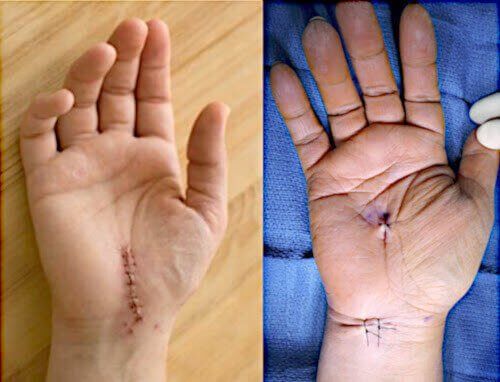Guide to Carpal Tunnel Surgery Recovery
From Dr. Z - Carpal tunnel syndrome specialist
Factors Affecting Carpal Tunnel Surgery Recovery
A frequent question doctors get is, “How long will my carpal tunnel surgery recovery be?” This question is born of fear and uncertainty when it comes to having carpal tunnel surgery. And who can blame you? Surgery is a big step in your life and you shouldn’t take it lightly.
I wish the answer was simple and straightforward, but it's not. Surgery recovery time mainly depends on:
- your overall health
- your medical history (and if you have a chronic illness)
- the complexity of the surgery (the type of carpal tunnel surgery you have)
- whether or not you have complications
- your commitment to routine hand therapy
You have to appreciate that this is a relatively complex operation. Let’s look at an appendix removal procedure for comparison. Less recovery time is expected compared to carpal tunnel surgery because not as many things can go wrong. Also, unlike appendix surgery, carpal tunnel surgery affects the complicated function of the hand. All of these factors affect the recovery time after surgery.
- FIND OUT: do you have carpal tunnel? No strings attached self-test.
When things go well with carpal tunnel surgery the patient is happy. But at times things go wrong. And that makes for a long and miserable surgical recovery period.
Actually, over 50% of carpal tunnel release surgery patients are not satisfied with their results 2 years later. Problems like prolonged pain, infection, nerve damage, and permanent loss of hand strength or mobility happen. These are just some of the problems that are discovered during recovery.
But let’s think positive! We’ll assume all goes well. That means you have an “uneventful” carpal tunnel surgery & recovery period. So here’s what you can expect.
Phases of carpal tunnel surgery recovery time
Carpal tunnel surgery’s goal is to cut the transverse carpal ligament in the hand. That “releases” wrist bones from squeezing and crushing the nerve inside. This 30 minute operation basically “decompresses” the nerve by allowing the wrists bones to snap open.
The 4 recovery periods or "phases" outlined below are dictated mostly by whether you have open release or endoscopic carpal tunnel surgery. The open release procedure causes more trauma to the hand. It also causes more postsurgical pain.
This is why it takes longer to recover from the open release method. But it does have significant advantages over endoscopic surgery (being safer is the biggest advantage).
Whichever type of surgery is used, the surgeon finishes stitching the hand and applies dressing. That’s when you officially begin your carpal tunnel surgery recovery period. It occurs in 4 phases:
- post-operative
- post-discharge
- short-term rehabilitation
- long-term rehabilitation
1. Post-operative carpal tunnel surgery recovery time
This period begins in the recovery room. You can expect to stay there from 2 to 4 hours. It all depends on the surgery anesthesia you had.
Nurses monitor you for signs of bleeding or reaction to the anesthesia. As you gain your senses, the staff will make sure all vital signs stabilize. Soon you will be alert, speaking, and responding well.
Assuming nothing went wrong (no complications) you're discharged. Every patient is discharged to somebody who can take them home.
2. Post-discharge recovery time
Once home you begin the post-discharge recovery phase. This lasts about 2 weeks. Your doctor's instructions will advise you to rest in the first 2-4 days. In fact, most of this phase will be spent resting.
Importantly, you must take care of the bandages. They must be kept clean and never get wet.
You will have post-surgical pain, which is normal. The medicines you’re given will lessen the pain, which may be more intense at night.
To lessen the pain, keep your hand elevated most of the time, especially while sleeping. This also reduces stiffness and swelling in the fingers.
In a few days you may begin doing light work. This includes brushing your teeth and eating. Doing so keeps your hand from getting stiff.
About two weeks marks the end of the post-discharge recovery phase. You will then return to the hospital to have the
stitches removed.
3. Short-term rehabilitation
Most doctors agree this period is critically important. That’s because good carpal tunnel surgery aftercare determines how well your hand will function in the future. This phase lasts from 2 to 6 weeks.
With the bandages and stitches removed, you must take care of the scar. This means protecting it from bumps and bangs, which could hurt a great deal. It's also helpful to gently massage the scar with vitamin E oil to both reduce pain and eventually help lessen the visible scar.
Gradually you will do more, like drive and even go back to work. You will also begin a gradual increase in hand activities as part of your daily hand rehab. This includes physical therapy stretches, strength training, and range of motion exercise.
It’s important to start a rehab program quickly. Your hand’s strength and mobility will depend on how hard you work toward that goal.
4. Long-term rehabilitation
This is the longer-term rehab and recovery phase. This extended time period can last from 6 to 12 months.
During this time you're participating in a routine hand rehab and therapy program. Gradual strength training is the main goal as your hands do increasingly harder and more complex work.
But don’t fall into a trap and do the things you did before the surgery! For most people, carpal tunnel syndrome is a job related (or occupational) disorder. That means your work probably caused the hand problems to begin with.
In fact, carpal tunnel syndrome symptoms will almost always return after surgery if you return to the same job. So be mindful of this. The LAST thing you want is another surgery on the same hand!
Conclusion
How quickly you progress through the 4 phases of your carpal tunnel surgery recovery time will depend on several factors. The most important factor is the type of surgery you have (open release versus endoscopic). Also, whether or not there are complications will affect your recovery – and your ultimate outcome. In addition, how well you follow your doctor’s instructions is crucial. Finally, your overall health plays a major role in recovery.





